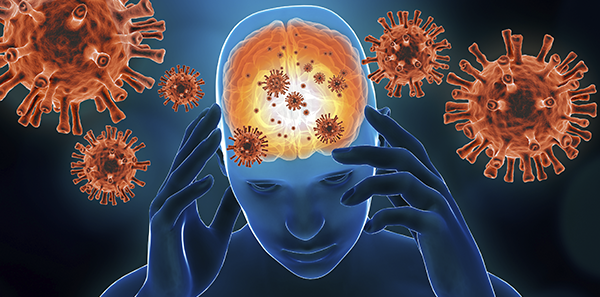


A rare infection known as meningitis attacks the thin meninges, which cover the brain and spinal cord. Your spinal meninges offer structure and support as well as injury protection for your brain and spinal cord. They have blood arteries, nerves, and protecting fluid. Meningitis also goes by the term of spinal meningitis. Basically, it is an inflammation of the membranes and fluid of the protective layer. Meningitis can affect anyone at any age. However, it spreads quickly among people who live close together, making boarding school students, college students, and teenagers more susceptible to infection. Meningitis can be brought on by bacteria, viruses, fungi, worms, parasites, and non-infectious diseases.
The flu-like symptoms of early meningitis could exist. The onset of symptoms of meningitis can take several hours or several days.
Meningitis rash is most frequently caused by viral infections. Bacterial infections and, in rare cases, fungal and parasitic illnesses come next. Through the body, a bacterium, fungus, virus, or parasite travels until it reaches the brain or spinal cord. Finding the reason is critical since bacterial infections can be fatal. Meningitis rash is brought on by both infectious diseases (diseases brought on by an outside threat to your body) and non-infectious ailments. Bacteria, viruses, fungus, parasites, etc. are infectious causes. Various illnesses, treatments, and other disorders are examples of non-infectious causes.
The most typical type of meningitis is acute bacterial meningitis. Acute bacterial meningitis accounts for 70–80 percent of all cases. Meningitis caused by bacteria can be fatal. The infection may result in swelling of the tissues around the brain. Bacterial meningitis is brought on by bacteria that enter the bloodstream and go to the brain and spinal cord. In turn, this disrupts blood flow, which may cause paralysis or even a stroke. Although bacterial meningitis is uncommon, it is often dangerous and can be fatal if untreated. In some cases of bacterial meningitis, a severe head injury or a serious local infection, such as a serious ear infection or nasal sinus infection, allowed the bacteria to travel to the meninges.
The most typical type of meningitis is viral meningitis. Meningitis caused by a virus affects the meninges, the protective membranes that surround the brain and spinal cord. It usually only causes moderate symptoms, such as headache, nausea, sensitivity to bright lights, and tiredness, and is much less serious than bacterial meningitis. The illness can be caused by a variety of viruses, including those that produce diarrhea.
The central nervous system, which includes the brain and spinal cord, is susceptible to fungus infections that spread through the blood. When this does place, it may result in fungal meningitis, an inflammation of the lining that protects the central nervous system. In addition to being extremely uncommon, fungus does not spread easily. Compared to bacterial or viral meningitis, fungus meningitis is far less frequent. It rarely affects healthy persons. If you suffer from an immune system disorder, such as AIDS, you run a higher risk of developing this type of meningitis.
Additionally unusual is parasitic meningitis. It is brought on by parasites, which typically infect animals. You can contract it by consuming parasite-infected fish, poultry, snails, slugs, snakes, fish, or produce that has parasite eggs in it. Foods that are uncooked or undercooked carry a higher danger.
Naegleria fowleri is a single-celled amoeba that causes the uncommon and serious disease known as primary amoebic meningoencephalitis (PAM). An ameba, or single-celled living thing, called Naegleria fowleri inhabits soil and warm freshwater environments like lakes, rivers, and hot springs. It usually results in death and damages the brain and its linings by inflaming them.
Although meningitis, or swelling of the meninges, is not communicable, some of its causes are. Meningitis rash can be transmitted from person to person in the majority of bacterial and viral cases. Other types of meningitis cannot be contracted from someone else.
Meningitis is a rare but dangerous, perhaps fatal infection. When a newborn receives early diagnosis and treatment, they almost usually make a full recovery. A baby can still recover if treatment is postponed, but they might be left with one or more long-term problems.
Bacterial meningitis is brought on by bacteria that enter the bloodstream and go to the brain and spinal cord. However, bacterial meningitis can also develop when bacteria enter the meninges directly. This could be brought on by a skull fracture, an ear or sinus infection, etc.
Meningitis caused by bacteria is dangerous. Death from the virus can happen in as little as a few hours for some patients. But most people who get bacterial meningitis recover. Those who do recover could suffer from long-term impairments include brain damage, hearing loss, and learning difficulties.
Death from the virus can happen in as little as a few hours for some patients. But most people who get bacterial meningitis recover. Those who do recover could suffer from long-term impairments include brain damage, hearing loss, and learning difficulties.
Bacterial meningitis is almost usually fatal if left untreated. The chance of death is decreased with treatment. The chance of death with treatment is between 20 and 30 percent for newborns and about 2 percent for older children. Even with treatment, individuals still have an increased mortality risk of 19 to 37%.
Hands should be washed frequently. Clearly rinse. Teach your children to wash their hands frequently as well, particularly after using the restroom or when you are in a public area.
What Is Acute Respiratory Infections & Its Common Infections
How Mosquitos Zika Virus Affect During Pregnancy?
Cardiovascular Disease & How To Prevent CD In Child